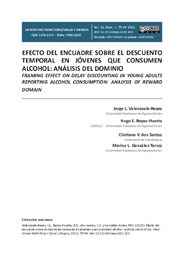Por favor, use este identificador para citar o enlazar este ítem:
https://hdl.handle.net/11000/29223Registro completo de metadatos
| Campo DC | Valor | Lengua/Idioma |
|---|---|---|
| dc.contributor.author | Valenzuela Reyes , Jorge Luis | - |
| dc.contributor.author | Reyes Huerta, Hugo Eduardo | - |
| dc.contributor.author | dos Santos, Cristiano V. | - |
| dc.contributor.author | González-Torres, Marina Liliana | - |
| dc.contributor.other | Departamentos de la UMH::Psicología de la Salud | es_ES |
| dc.date.accessioned | 2023-05-09T09:46:22Z | - |
| dc.date.available | 2023-05-09T09:46:22Z | - |
| dc.date.created | 2022 | - |
| dc.identifier.citation | Health and Addictions/Salud y Drogas Vol. 22. Núm. 1 | es_ES |
| dc.identifier.issn | 1988-205X | - |
| dc.identifier.issn | 1578-5319 | - |
| dc.identifier.uri | https://hdl.handle.net/11000/29223 | - |
| dc.description.abstract | Favorecer la preferencia por beneficios futuros se ha logrado al hacer explícito que los resultados de una elección implican no recibir la alternativa no elegida, hallazgo denominado efecto del cero escondido. Objetivo. El presente estudio evaluó la generalidad del efecto en tareas de descuento por demora en dos dominios (i.e., monetario y sa-lud) con participantes que reportaron consumo de alcohol. Método. Los participantes fueron expuestos a dos tipos de tareas, una con el cero implícito y otra con el cero explícito, esto en ambos dominios y empleando dos recom-pensas de distinta magnitud. Resultados. Los resultados mostraron una tendencia en la que el grado de descuento incrementa en función del consumo de alcohol, al menos para el caso de consecuencias monetarias. Además, se re-plicó el efecto del cero escondido y el efecto de magnitud independientemente del nivel de consumo de alcohol en tareas monetarias. No obstante, ninguno de estos efectos se observó en el dominio de salud con el procedimiento empleado. Adicionalmente, no se observó una asociación sistemática de la tasa de descuento con las consecuencias negativas vinculadas al consumo de alcohol. Conclusiones. Hacer explícito el costo de oportunidad resulta en una disminución de la tasa de descuento de recompensas monetarias, pero se requiere mayor investigación para preci-sar la ausencia del efecto en situaciones que involucran decisiones sobre la salud | es_ES |
| dc.description.abstract | Preference for delayed rewards has been promoted by making explicit that preference for one alternative implies not receiving the not chosen alternative, a result named the hidden-zero effect. Objective. The present research assessed the generality of the hidden-zero effect in delay discounting tasks in two domains (i.e., monetary and heal-th) in participants that reported alcohol consumption. Method. The participants were exposed to two discounting tasks, one with the implicit zero and one with the explicit zero, using both health and monetary rewards and emplo-ying different amounts. Results. Results showed a tendency to reduce the value of future monetary consequences at higher rate as a function of alcohol drinking. Also, the hidden-zero effect and the magnitude effect were repli-cated in the monetary domain independently of alcohol drinking status. Nevertheless, none of these effects were observed using health outcomes with the actual procedure. Finally, no systematic association between discounting rate and negative consequences derived from alcohol consumption was observed. Conclusions. Making explicit the opportunity cost reduce discounting rate of monetary outcomes, but more research is needed to clarify the absence of effects when deciding about health. | es_ES |
| dc.format | application/pdf | es_ES |
| dc.format.extent | 16 | es_ES |
| dc.language.iso | spa | es_ES |
| dc.publisher | Universidad Miguel Hernández de Elche | es_ES |
| dc.rights | info:eu-repo/semantics/openAccess | es_ES |
| dc.rights.uri | http://creativecommons.org/licenses/by-nc-nd/4.0/ | * |
| dc.subject | Descuento por Demora | es_ES |
| dc.subject | Efecto de Encuadre | es_ES |
| dc.subject | Efecto del Cero | es_ES |
| dc.subject | Dominio | es_ES |
| dc.subject | Salud | es_ES |
| dc.subject.other | CDU::1 - Filosofía y psicología::159.9 - Psicología | es_ES |
| dc.title | Efecto del encuadre sobre el descuento temporal en jóvenes que consumen alcohol: análisis del dominio | es_ES |
| dc.type | info:eu-repo/semantics/article | es_ES |
| dc.relation.publisherversion | https://doi.org/10.21134/haaj.v22i1.616 | es_ES |

Ver/Abrir:
616-Texto del artículo-3533-1-10-20220217.pdf
540,14 kB
Adobe PDF
Compartir:
 La licencia se describe como: Atribución-NonComercial-NoDerivada 4.0 Internacional.
La licencia se describe como: Atribución-NonComercial-NoDerivada 4.0 Internacional.
.png)